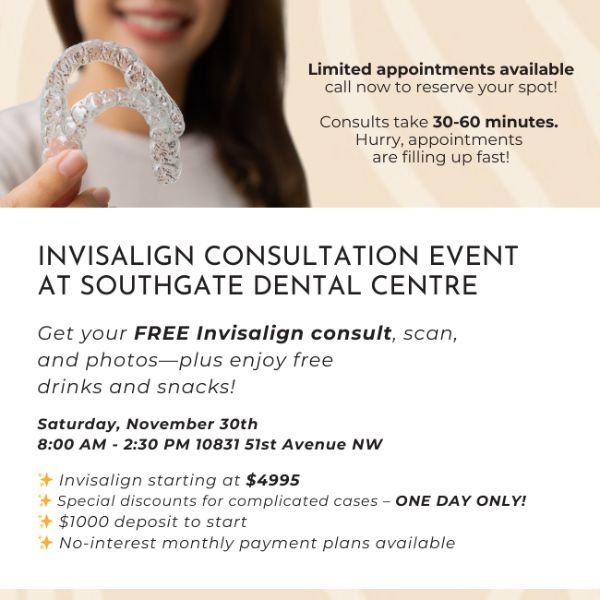Do you remember being terrified of dental appointments as a child? Your dentist has your best interests at heart, but the process can be stressful. Regular exams and cleanings are vital to your dental health and fear and anxiety shouldn’t stop you from keeping your teeth healthy.
Thankfully, there are ways to relieve this stress and anxiety before and during your appointment. Learn more about the ways to overcome and reduce dental anxiety below.
What is Dental Anxiety?
“Dental anxiety” describes stress, fear, or anxiety regarding the dentist. It is a common fear for Canadians and severe cases can lead to complete avoidance of the dentist. Dental anxiety can be caused by the overall stress of the dentist or from specific experiences such as fear of pain or injections.
Dental Anxiety Causes
Anyone can experience dental anxiety for a variety of different reasons. Some common causes include:
Fear of pain
Many people fear pain when they visit the dentist. A bad dental experience can create an association with pain or discomfort.
Loss of control
People can feel a loss of control at the dentist during oral examinations or dental procedures. When you have to sit still, with your mouth held open, unable to see anything happening, you can feel like you have no control.
Fear of injections
Many people fear needles and injections. This fear can be worsened when a patient knows a needle may be inserted into their mouth. Fear of injections can also include the stress of too little anesthesia being given or injections wearing off during dental procedures.
Loss of personal space
Some patients may feel embarrassed or uncomfortable with someone being so close to them or their face. They may feel self-conscious about their oral hygiene as well.
These are only a few common causes of dental anxiety. This fear is unique and personal to any individual experiencing it. There are some general signs of dental anxiety people may show.
Dental Anxiety Symptoms
- Elevated heart rate
- Visible distress (crying or panicking)
- Nervousness before an appointment
- Sweating
- Humour or aggressive behaviour to hide anxiety
Dental anxiety can cause someone to miss or avoid their appointments, but regular dental visits and cleanings are vital to your oral health. Your appointments shouldn’t be missed because of the importance they have in the prevention of dental disease and the protection of your teeth.
Your Dental Health
Dentists help to ensure your teeth and mouth are healthy. Your teeth should be examined and cleaned twice a year. These cleanings prevent plaque build-up in hard-to-reach areas and regular examinations make sure your dental hygiene is effective.
Dental anxiety may cause someone to avoid these appointments. Your dentist is vital for keeping your teeth healthy, but this doesn’t mean you should just “suck it up” if you’re having anxiety or stress. Your safety and comfort at the dentist are equally important to your oral health.

Tips to Overcome Dental Anxiety
There are several ways to overcome or reduce dental anxiety. These may be done by yourself or with the help of your dentist. If you have any dental anxiety, inform your dentist and they can find ways to make you feel more comfortable.
Before Your Appointment
Deep breathing
You can practice deep breathing at your home or in the waiting room of your dental office. The key is to breathe through your diaphragm. Breathe deeply, allow your abdomen to fill with air and exhale through your nose. Keep breathing like this until you notice stress relief.
Guided meditation
Guided meditation (or guided imagery) helps you relax by forming mental images of places or things you find relaxing. Incorporate as many senses as possible to help create an effective calming presence. You can try this alone, but if you have limited experience, there are many online videos or podcasts to follow.
During Your Appointment
Distraction
Distraction is an effective way to reduce dental anxiety and is used frequently with children. It can be done by having your dentist continuously talk to you during your exam or through the use of music or screens. This allows your brain to focus on something other than your ongoing appointment.
Many dental clinics have televisions or radios set up in the exam room for you to use. Ask your dentist about bringing headphones if these options aren’t available.
Active participation
This strategy focuses on having your dentist explain what is currently happening in your exam. Inform your dentist of your anxiety and they can include you in the dental process. If you know what is happening and what is expected, you may feel your tension ease.
Suggest a signal
The visit may feel overwhelming at times. Establish a signal such as a raised hand, to let your dentist know to stop what they are doing. This can let you relax if you feel uncomfortable or need a break.
Speak with your dentist
These tips are not the only options you have. At the beginning of your appointment, discuss any anxiety, fear, or stress you’re facing. Open communication can help your dental team find the best way to help you feel relaxed and comfortable.
Most people face at least a small amount of anxiety when visiting the dentist. It can be hard to completely silence the little voice inside your head, but try to remember your dentist is here to help.
It’s also crucial to come in for your regular dental cleanings and check-ups. These can help prevent cavities. If you do need other dental procedures, like fillings, extractions, or root canals, your regular dentist can refer you to a sedation dentistry practice. That way, you won’t have to be awake for more involved procedures.
Visit Your Dentist
Don’t avoid the dentist, even if it feels like the right thing to do. If you’re experiencing any signs of discomfort in your mouth, or simply need a regular exam and cleaning, book an appointment. Be honest about any fear or anxiety you have and remember your dentist has your best interests at heart.



